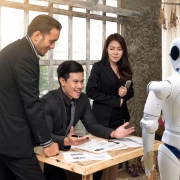Welcome To the Great Reset. Start Managing For Perpetual Change.
We surpassed the unemployment of The Great Recession. In two weeks. For our economy and our society, we need to flatten The Slump.
As the surreal impact of the pan-global pandemic sinks in, we can all be forgiven if we feel suddenly thrust into a dystopian science fiction movie. When it comes to work and our economies, The Great Reset has accelerated so many tech-fueled trends that the list grows daily. To paraphrase sci-fi author William Gibson, the future of work is here. It’s just not evenly distributed.
We’ve known for some time what we needed to do. We’ve talked about Digital Transformation, Agile Organizations, and Lifelong Learning until they’ve become cliches, more observed in aspiration than in practice in too many organizations.
Then along came a virus.
Suddenly:
- We are working as fully-distributed teams, with every in-person meeting instantly transformed into a Brady Bunch-style videoconference scrum.
- Our organizations are being forced to adapt literally overnight. This isn’t agility, though. It’s a survival reflex.
- Colleges have become hybrid learning platforms, virtual and physical, likely transformed forever, while adult online classes are also surging.
And societally, we are rapidly turning into Amazon-ordering, Zoom-clustering, auto-cocooning consumers. (Nothing new. Just exponentially more.)
The speed and scope of these changes dwarf prior shifts so dramatically that we would have probably stopped binge-watching any streaming video movie that hung its narrative on such an implausible plot. Superlatives fail. The exponential curves of technology adoption like the microprocessor and the smartphone used to be the sole purview of Singularity University lectures (including mine, on the future of work). But the progression of the novel coronavirus has seared the image of hockey-stick growth on a billion minds.
But there is a reverse hockey stick at work, an exponential Slump. It’s called Jobs.
We have seen this script before. Each of the modern economic downturns – early 1990’s, 2001, the Great Recession – had a seismic impact on the world of work. But to take the risk of quoting those pundits of exponential change, Bachman Turner Overdrive, you ain’t seen nothing yet. John Hagel from Deloitte’s Center for the Edge calls these tectonic transitions Big Shifts. The Great Reset may become the Biggest Shift in our lifetimes.
What happens in such transitions?
- Unemployment musical chairs means the music stops for millions. The Great Recession at its peak displaced about 9 million – a level we hit this time in just two weeks. The Fed suggests that nearly half of all jobs – 67 million- may disappear. Let that sink in.
- Automation accelerates. Each of the last three recessions dramatically increased technology implementation in business. As Mark Muro of Brookings Institution says, “What can be automated, likely will be.”
- Unbundling work accelerates that process. As we distribute and atomize tasks, we make it far easier to mobilize AI software such as Robotic Process Automation, which automates routine tasks like filling out forms and moving documents through workflows–the kind of work done by millions in call centers, for example. And the hyper drive to increase productivity and reduce costs in the post-Reset economy will place enormous pressure on organizational leaders to only re-hire people for the most critical roles.
- The Middle evaporates. From 2007 to 2017, the vast majority of new hiring in the U.S. was in non-standard, impermanent roles. The low end of wages has already become the realm of precarious gig work, and the upper wages are reserved for veterans and experts, like blockchain and AI programmers. Technology inevitably reduces the amount of middle-skilled work.
The Unemployment Slump is likely to happen in three phases.
- In Phase One, there is a downward plunge in employment, and a dramatic rise in business failures. We could hit the bottom as soon as June.
- In Phase Two, as we riffle along for an indeterminate period, some geographies will begin recovery, but it will literally be like a fever chart, with intermittent employment wins and losses. This could last a quarter, or maybe it could last a year and a half. Much of the work people do find will be informal, precarious, and impermanent. And then a third wave of failures will appear, when municipalities and states see huge drops in tax revenue.
- In Phase Three, the recovery accelerates. Some industries will bounce back rapidly, but others, like hospitality, air travel, and tourism, will take far longer. And as history is our guide, it will leave many behind, especially low-wage workers and those in rural areas.
So here in Phase One, if we want a thriving Phase Three economy, we need to get busy. We must:
- Retain and hire workers. That’s literally Job One. Courageous leaders need to maintain as many people as possible on the payroll. Salesforce CEO Marc Benioff has already pledged no significant layoffs among the company’s 50,000 employees for at least 90 days, and called for other CEOs to pledge the same. We must also pressure policy-makers to provide surge after surge of economic stimulus pegged to a healthy level of employment – paying businesses directly to retain their workers. Look at Denmark and the UK for inspiration as they fund their countries’ payrolls.
- Help workers shift to in-demand work. Instacart, Walmart, Amazon and other supply chain and delivery businesses are hiring like crazy.
- Automate. But automate to enhance, not replace. Help workers develop superpowers, reducing the amount of mundane work and increasing their ability to solve tomorrow’s problems.
- Get inclusive. The least prepared are the most vulnerable. Stop hiring your traditional profile, and prize the transferable skills of your non-traditional candidates. Psychological diversity wins.
- Stop thinking about intermittent change management, and start managing perpetual change. Today it’s a virus. Tomorrow it could be Artificial General Intelligence. More exponential curves are just down the road.

We need to do this because it’s the right thing to ensure every human has access to meaningful, well-paid work. Or, if that’s not enough incentive, do it because otherwise, you won’t like the economy we get later.
The Great Reset will forever transform everyone’s lives in many ways. The most important way is that this virus has in a few short months shown us the interconnections between virtually every human life on the planet. But after the health of people comes the health of work and the economy.
No human left behind.
Gary A. Bolles is the Chair for the Future of Work with Singularity University. He posts regularly on LinkedIn.







